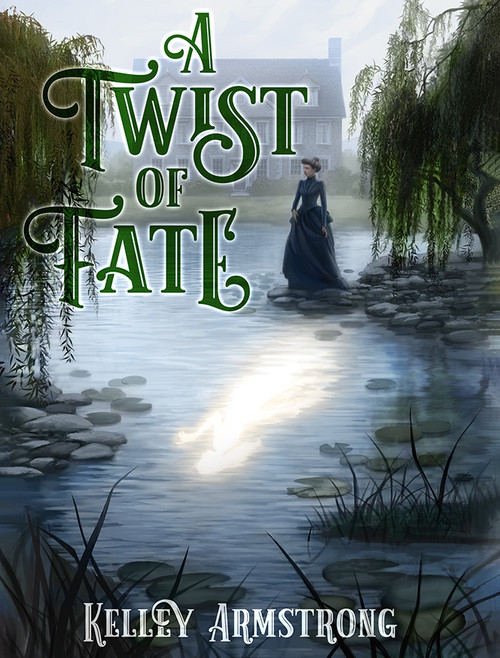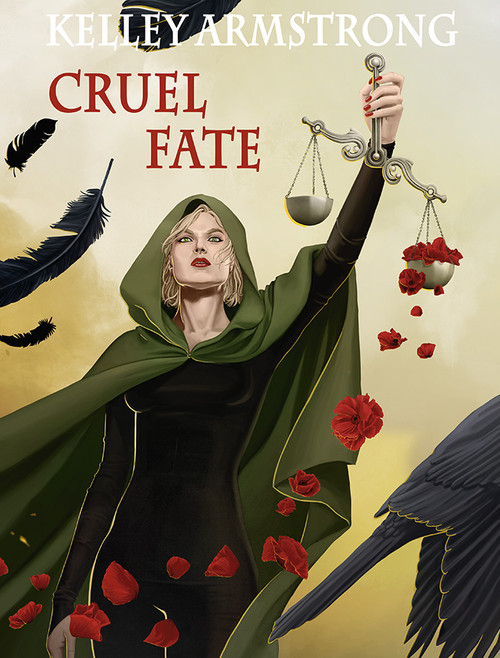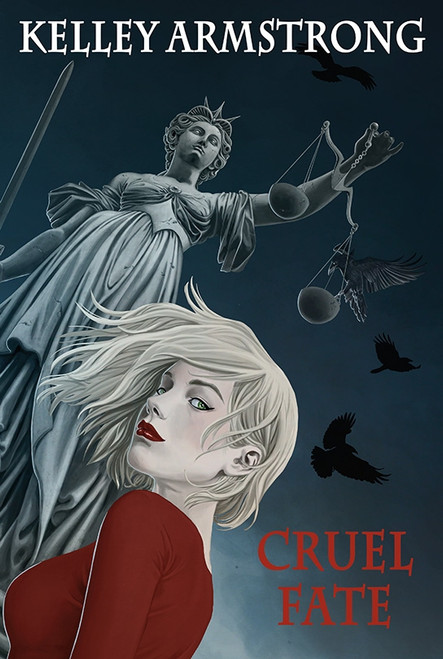Dust jacket and endsheet illustrations by Miranda Meeks
Three years ago, Rosalind Courtenay stumbled from the nineteenth century to the twenty-first, where she has been trapped ever since, leaving her husband and infant son behind. Now she’s found her way back.
The problem, of course, is how to explain her absence to her husband. Does he think she abandoned him? Has he remarried? Is he happy in a new life? Rosalind decides to don a disguise in hopes of answering her questions before showing up on his doorstep. Instead, a twist of fate has her mistaken for her young son’s new governess.
Rosalind has every intention of revealing herself as soon as August returns home from business. Until then, she’ll get to know her son, a quiet child who has inexplicably been abandoned by an endless stream of governesses. That’s when the hauntings begin. Rosalind has finally come home and someone—or something—doesn’t just want her gone. They want her dead.
Lettered: 26 signed leatherbound copies, housed in a custom traycase
Limited: 2000 signed numbered hardcover copies
A Twist of Fate
(excerpt)
It happened on my honeymoon. August and I were on a ship bound for Italy. It was our second day into the voyage, and we’d only left our stateroom for food. That morning, we were stretched out naked on our bed, the sea breeze drifting through the open porthole. I remarked on how incredible it was that we could travel to Rome in a few days, and I mused on how much faster it might be for our great-grandchildren.
“You should ask William about that,” August said, cutting an apple and handing me half. “I believe he may have secret knowledge of the future.”
“It certainly seems like it, with his gift for investing.”
“Not a gift at all. As I said, secret knowledge.” He slid closer and lowered his lips to my ear, as if we were not alone in our stateroom. “I believe he once knew a girl from the future.”
I sputtered a laugh. “The future?”
He rolled onto his back. “The summer we were fifteen, he became incredibly, irritatingly distracted, with scarcely any time at all for me.”
“No time for you? Or your youthful shenanigans?”
“Shenanigans? True, I was a bit of a rascal, getting myself into this bind and that.”
“Bind,” I murmured. “Now that is a word I have never heard used to refer to a lady’s private parts.”
He choked on a bite of apple, sputtering as he coughed it out. He waggled a finger at me. “I was a very proper young man, Rosie, who saved himself for his marriage bed.”
That had me laughing hard enough that someone rapped on our door to be sure we were all right. August assured him we were.
“So William shunned your company,” I said. “That summer you were busy falling into binds, and he did not wish to join you.”
August shook his head. “I will not rise to your bait, only saying that your opinion of my youth is very wicked. Not inaccurate, but still wicked. So William spurned me, and being mildly jealous—”
I cleared my throat.
He gave me a look. “All right. Very jealous. A man must have one flaw, and that is mine.”
“One flaw?”
“Others have more. I have but one.” He coughed to cover my laugh. “And so, to resume my tale, I became jealous and resolved to learn the reason for his distraction. It was a girl.”
I gasped. “Truly? A young man distracted by a young woman. What a twist in the tale!”
He rapped my bare bottom with one finger. “You mock, but William was not me, and I had never seen him display more than mild interest in the fairer sex. Yet there he was, enthralled by a secret love. Even more remarkable was the girl herself, who dressed and spoke in the oddest way.”
“Because she was”—I gripped his arm, my eyes mock wide—“from the future!”
“Well, no, at first, I thought she might be French. Or American. Or perhaps some fae creature from his beloved moors. After that summer, William fell into the darkest brood, and I realized the affair had come to an unhappy end, and I resolved not to tease him about his mysterious buxom brunette. Then, years later, when his mother passed and he realized the family coffers were near to empty, he began making the maddest gambles, investing in newfangled ideas that seemed destined to failure.”
“Yet they succeeded, and thus he filled the family coffers to overflowing. And somehow that is proof that this girl was from the future…?”
“She gave him information on the future. On inventions yet to come.”
“So William Thorne fell madly in love with a girl from the future, who broke his heart but shared secret knowledge of her advanced culture.” I peered at him. “Are you sure she wasn’t French?”
He laughed and pulled me to him for a kiss. And that was the end of the conversation as we resumed our honeymoon and promptly forgot everything else.
I still do not leap on August’s speculations as the obvious answer. Yet there is another aspect to the tale that forces me to consider it.
August hadn’t merely raised the possibility of traveling through time as a hypothetical fancy. He’d been talking about William Thorne, who’d met a strange girl at Thorne Manor, a girl with odd dress and odd speech, whom William kept hidden, a girl August believed came through time.
A girl who came through time at Thorne Manor. Where I opened a box and tumbled into the dusty and abandoned bedroom of a girl.
It is then that I remember the kitten. I return to the bedroom and, in the light of day, clearly see tiny feline tracks on the dusty floor. Tracks that lead to the foot of the bed and disappear.
A kitten from the future, who somehow passed through time and found herself trapped in a box that doesn’t exist in her world. She cries for help, and I come running, only to pass through time in the other direction.
That is both perfectly sensible and perfectly ridiculous. Yet if time travel exists perhaps it is like yeast, an inexplicable but proven chemical reaction. Add yeast to the right ingredients, mix in the right environment, and you can make dough magically rise. Add a portal to a house, mix in the right circumstances, and you can blink through time.
Someone in the distant past discovered that yeast makes dough rise. For centuries before that, people ate unleavened bread. Was it not possible that I had made a discovery of my own? One made before me by a girl who met a boy from another time, loved him and then disappeared back to her own realm?
The solution then is obvious. Recreate the circumstances and return to my husband and child.
I plant myself in that spot, matching my dust-cleared footprints exactly. And there I stand through four hourly chimes of the clock below.
I had arrived shortly before the grandfather clock struck three in the morning. Perhaps timing is the key then. That night, I stand on that spot from one until five. I repeat this every night for a week. Then I think perhaps the moon matters, and I wait for it to be in the same portion of the cycle and try again.
I wear the same dress. I position myself as if opening an invisible box. I arrange my features in some semblance of surprise, as if seeing a kitten. Nothing works.
For six weeks, I try to get home. When I need food, I forage or raid village gardens at night. Days and weeks come and go, and I stay. I stay in an empty house, crying myself to sleep, dreaming of my husband and child, becoming a mere ghost of myself.
I stay, and the kitten does not return, and when six weeks have passed, I begin to understand what that means.
I am here, and I am not going back.
That leaves me two choices. Fade away with wanting, drifting into madness as I haunt this empty house. Or make a life for myself here. Make a life while never giving up hope, while never stopping my efforts to return to my family.
I stay until the second change of the moon brings me no closer to home. Then I dry my tears and walk out of Thorne Manor.
- artists_list:
- Miranda Meeks
- authors_list:
- Kelley Armstrong
- binding:
- Hardcover
- book_case:
- None
- book_edition:
- Lettered
- book_length:
- 288 pages
- book_type:
- Novel
- country_of_manufacturer:
- United States
- isbn:
- 978-1-64524-052-5
- is_subpress:
- Yes
- print_status:
- In Print
- year:
- 2021




